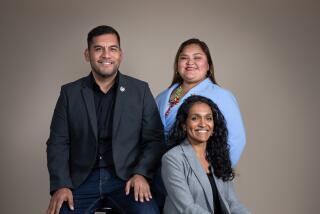Applaud Hernandez for Courage
- Share via
I have been looking for a way to channel my rage over the mounting pressure on Los Angeles City Councilman Mike Hernandez to resign. The mayor, five of Hernandez’s council colleagues and the editorial writers of the Los Angeles Times have led a cacophony of voices calling on Hernandez to step down in the wake of his admission that he used cocaine and alcohol while in office; police reportedly found drug traces on his desk in City Hall.
I know how stark and disturbing an image this is. Having grown up in Los Angeles, I remember the days, not so long ago, when no politician would dare to disclose his or her alcohol abuse, let alone the use of illegal drugs. In those more “innocent” times, an elected official’s drinking to excess was never written about in the press. There was an unspoken agreement that if you could drink all night and still show up for work the next day, it was nobody’s business but your own. This agreement was convenient for many political reporters, who often tossed back a fair number of drinks with the same politicians whom they were assigned to cover.
Those were the good old days, right?
Wrong. Dead wrong. Those were the days when the disease of alcohol and drug addiction caused so much shame and embarrassment to those who suffered with it that they were afraid to admit that they had an illness, much less seek treatment and risk public exposure. Many died as much from fear as from liver failure.
Like Hernandez, I have chosen a career in service, but my path has taken me into the private sector, currently as the director of a drug and alcohol treatment facility. Each year, I work with hundreds of recovering addicts, many of them from high-profile professions. If there is one consistent unifying theme in their recovery, it is that every addict--no matter how famous, no matter how wealthy, no matter how powerful--must first admit that he or she has a disease. With that simple yet incredibly difficult step, a lifetime journey toward sobriety begins.
Hernandez has taken that first step, and each new day is another opportunity for him to renew his faith in himself. He has accepted responsibility for his actions. He has been in treatment and is in a court-ordered diversion program. If he stays sober, the program will allow him to avoid a felony record. Contrary to the hysterical rhetoric surrounding this case, this is the rule, not the exception, for first-time possession arrests in Los Angeles. Hernandez is receiving no special treatment.
If this were any other illness, Hernandez’s courage in going back to work while in recovery would be applauded. In the recent American League championship series, when Baltimore’s Eric Davis was struggling at the plate, some criticized manager Davey Johnson for using Davis, who was receiving chemotherapy treatments for colon cancer. Their carping turned to cheers when he hit a home run to win a crucial playoff game for his team.
I would ask Mayor Richard Riordan, who refers to “the terrible, terrible message” Hernandez’s conduct sends to young people, what message Hernandez would be sending if he were to resign. It would be a message of ignorance over information. It would reaffirm the old message that politicians should never disclose the disease of addiction because people will judge them harshly for it. And it would be a warning to young people who are at the greatest risk from this disease that if they decide to seek help, they could lose their jobs, their friends, their place in the community.
I agree with my mother that we must hold elected officials to a higher standard of accountability. But we disagree as to what that standard is. Those who have called for Hernandez’s resignation ignore the importance of what he is doing, not only for himself but also for his constituents and the city. By doing his job effectively, seriously and, yes, soberly while remaining in recovery, he can provide a valuable example of courage in the face of adversity. The last time I checked, that’s what leadership was all about.
More to Read
Sign up for Essential California
The most important California stories and recommendations in your inbox every morning.
You may occasionally receive promotional content from the Los Angeles Times.










